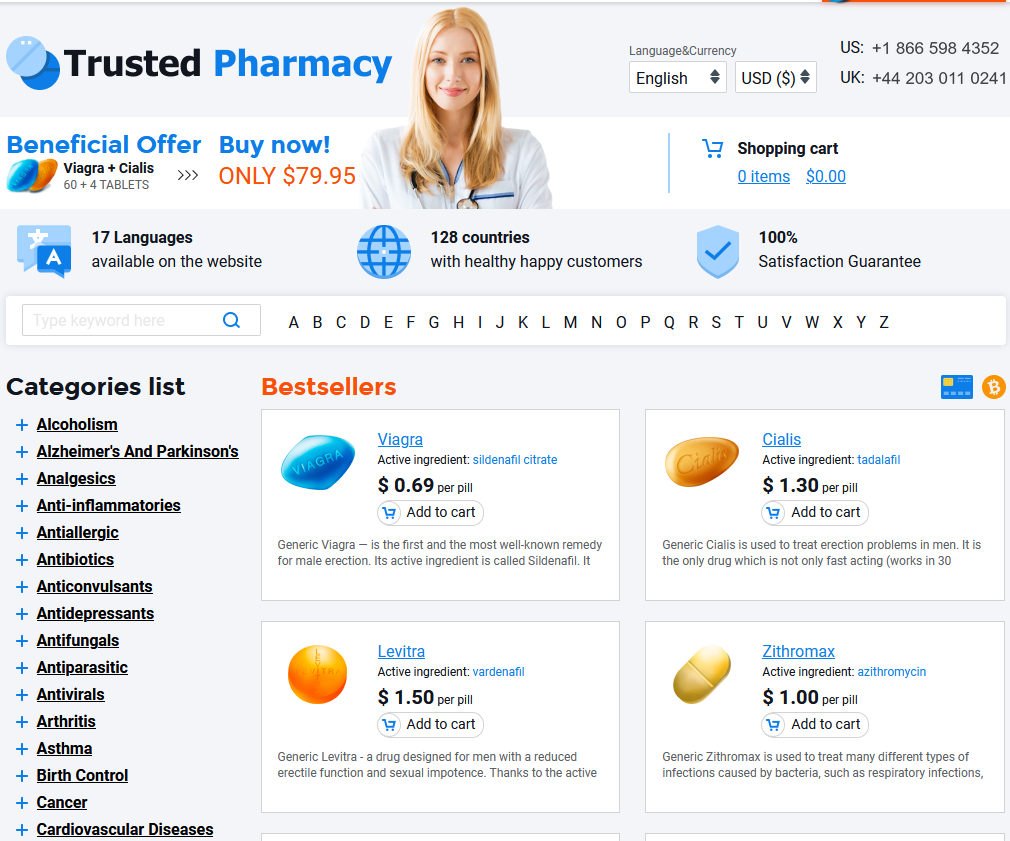To Visit Online Pharmacy Click HERE ↓
The role of Augmentin in fighting against antibiotic resistance.
Empowering Antibiotic Treatment with Augmentin:
Augmentin is a powerful antibiotic medication that has been widely used to treat a range of bacterial infections for over three decades. This medication is a combination of two active ingredients, amoxicillin, and clavulanic acid, which work together to destroy harmful bacteria while also preventing the emergence of antibiotic-resistant strains. Augmentin has been highly effective in treating some of the most common infections, including urinary tract infections, sinus infections, and pneumonia, among others.
One of the key benefits of Augmentin is its ability to tackle bacteria that have become resistant to other antibiotics. The addition of clavulanic acid to amoxicillin helps to prevent the bacteria from secreting enzymes that can render antibiotics ineffective. This is vital because antibiotic resistance is a growing concern worldwide, and an increasing number of infections are becoming difficult to treat with conventional antibiotics. In this context, Augmentin has emerged as a game-changer in the fight against antibiotic-resistant infections.
Empowering Antibiotic Treatment with Augmentin
Amidst the escalating threat of antibiotic resistance worldwide, researchers and healthcare professionals have been actively seeking solutions to combat it effectively. Augmentin, a combination of amoxicillin and clavulanate potassium, has emerged as a potent weapon in this fight against antibiotic resistance. The drug is an extended-spectrum antibiotic that belongs to the beta-lactam class and has been found to be effective in treating many bacterial infections that have otherwise become resistant to other antibiotics.
Augmentin: The Game Changer in Antibiotic Resistance
The principal reason why Augmentin is considered a game changer in antibiotic resistance is because of its unique formulation. Unlike other antibiotics, which target bacteria head-on, Augmentin acts by breaking down bacterial defenses such as beta-lactamase enzymes, which are responsible for making bacteria resistant to antibiotics. The additional clavulanate potassium ingredient in Augmentin helps block beta-lactamases and ensures that the antibiotic can work optimally. In this way, Augmentin has the ability to combat bacteria that have become resistant to other antibiotics and improve treatment success rates. While it is not a panacea for antibiotic resistance, Augmentin offers significant hope in managing resistant infections, and it is an excellent addition to the arsenal of antibiotics that healthcare professionals have at their disposal.
Fighting the Resistance with Augmentin
Antibiotic resistance is one of the major public health challenges that the world is facing today. The rampant use of antibiotics over the years has led to the emergence of antibiotic-resistant bacteria, making it difficult to treat various infections. Augmentin, a combination antibiotic drug, has emerged as a game-changer in the fight against antibiotic resistance. Its unique combination of amoxicillin and clavulanic acid makes it more effective than other antibiotics in treating a wide range of bacterial infections.
Augmentin is particularly effective against bacteria that produce beta-lactamase, which is an enzyme that renders many antibiotics ineffective. The clavulanic acid in Augmentin inhibits the beta-lactamase enzyme, which allows the amoxicillin to kill the bacteria. This mechanism makes Augmentin more potent against bacteria that have developed resistance against other antibiotics. The combination of amoxicillin and clavulanic acid in Augmentin also broadens its spectrum of activity, making it effective against a wider range of bacterial infections.
Overall, Augmentin's unique mechanism of action and broad-spectrum efficacy make it an essential tool in the fight against antibiotic resistance. With the continued rise of antibiotic-resistant bacteria, there is an urgent need for innovative approaches to combat them. Augmentin's ability to weaken the backbone of antibiotic resistance makes it a promising solution to this pressing problem. It is, however, essential to use Augmentin appropriately, following the recommended dosage and taking necessary precautions to prevent the emergence of further resistant bacteria.
Augmentin is a powerful antibiotic medication that has risen to prominence in the fight against antibiotic resistance. This drug is a combination of two active ingredients, amoxicillin and clavulanic acid, that work together to provide a potent solution against a variety of bacterial infections. One of the major benefits of augmentin is that it is effective in treating bacterial infections that have become resistant to other forms of antibiotics, making it a viable option for those who may not have had success with other treatment options.
When it comes to the dosage and administration of augmentin, it is important to follow your doctor's instructions closely. This medication comes in a variety of formulations, including tablets, powders, and suspensions, and the dose and frequency will depend on factors such as the severity of the infection and the patient's age and weight. It is also important to taking caution when administering augmentin to certain groups, such as pregnant or breastfeeding women, and those with liver or kidney function impairment. Overall, proper dosage and monitoring of augmentin is crucial in ensuring its safety and effectiveness in battling antibiotic resistance.
In conclusion, augmentin is a valuable tool in the fight against antibiotic resistance, providing a promising solution for those who are struggling with bacterial infections that have become resistant to other antibiotics. By following necessary precautions and dosing recommendations, augmentin can be a safe and effective way to combat antibiotic resistance, helping to weaken the backbone of this growing problem. As research continues into new and innovative ways to address antibiotic resistance, augmentin and other antibiotics like it will likely continue to play a critical role in this ongoing battle.
The usefulness of Augmentin in combating antibiotic resistance cannot be overstated. As one of the most effective antibiotics that combines two active ingredients of amoxicillin and clavulanic acid, Augmentin not only treats bacterial infections but also inhibits the enzymes that can break down amoxicillin, thereby reducing the possibility of resistant bacteria. It is an effective weapon against various strains of bacteria that cause infections, including Streptococcus pneumoniae, Haemophilus influenzae, and Moraxella catarrhalis.
Augmentin is particularly useful in treating infections that are resistant to other antibiotics such as penicillin. Its success in treating antibiotic-resistant infections makes it an important tool in the fight against antibiotic resistance. Also, the combination of two antibiotics in Augmentin reduces the chances of bacterial infections from adapting to resist medication, which underscores its role in weakening the backbone of antibiotic resistance over time. This way, Augmentin is still effective against bacteria that might have already become resistant to other antibiotics, leading to better patient outcomes.
In conclusion, the role of Augmentin in fighting against antibiotic resistance cannot be understated. It is a game changer in the world of antibiotic resistance, and its ability to treat antibiotic-resistant bacterial infections makes it a promising solution. Although it can have some potential side effects such as diarrhea, nausea, or allergic reactions in some individuals, the benefits of Augmentin outweigh the risks. To prevent further development of antibiotic resistance, the appropriate use of antibiotics like Augmentin should be encouraged.
The role of Augmentin in weakening the backbone of antibiotic resistance:
Antibiotic resistance is one of the greatest threats to public health worldwide. The excessive and inappropriate use of antibiotics in both humans and animals have led to the emergence of resistant bacteria which are difficult to treat. However, Augmentin is a unique antibiotic that has proven to be an effective tool against antibiotic resistance. Augmentin is a combination of amoxicillin and clavulanate potassium. Amoxicillin is a penicillin-related antibiotic that kills bacteria by inhibiting their cell wall synthesis. Clavulanate potassium, on the other hand, is a beta-lactamase inhibitor that prevents bacteria from breaking down amoxicillin, thereby making it more effective against resistant bacteria.
Augmentin works by targeting and destroying the bacteria in the body that have developed resistance to other antibiotics. Since its introduction in the 1980s, Augmentin has been widely used to treat various bacterial infections such as pneumonia, ear infections, and sinusitis. Moreover, studies have shown that Augmentin is effective against gram-positive and gram-negative bacteria. This makes it an essential weapon in the fight against antibiotic resistance. The use of Augmentin may reduce the burden of hospital-acquired infections and prevent the spread of resistant bacteria in healthcare facilities.
In conclusion, antibiotic resistance is a growing concern for public health, and it is imperative to find new drugs to combat this issue. Augmentin is a valuable tool in the fight against antibiotic resistance. Its unique combination of amoxicillin and clavulanate potassium makes it effective against resistant bacteria. Moreover, it is widely available, and its low cost makes it accessible to all people. Therefore, the use of Augmentin should be encouraged in clinical practice to help weaken the backbone of antibiotic resistance.
Augmentin is a powerful antibiotic medication that is widely used to combat bacterial infections. What makes Augmentin stand out from other antibiotics is its unique composition of two active ingredients, amoxicillin and clavulanic acid. The combination has proved to be extremely effective against a broad range of bacterial species, including those that have developed resistance to other antibiotics. Augmentin has thus become a game changer in the fight against antibiotic resistance.
One of the reasons why Augmentin is so effective is that it targets various cell aspects of bacteria, making it less likely for bacteria to develop resistance. Moreover, the clavulanic acid in Augmentin can prevent the bacterial enzyme beta-lactamases from breaking down the amoxicillin, which can cause antibiotic resistance. Augmentin's ability to overcome bacterial resistance makes it an ideal choice for treating infections that may not respond to other antibiotics. Therefore, healthcare professionals consider it a promising solution in treating antibiotic-resistant infections.
In conclusion, Augmentin plays a crucial role in fighting against antibiotic resistance. Its unique combination of amoxicillin and clavulanic acid not only enhances its effectiveness against a range of bacterial infections but also hinders the development of antibiotic resistance. Its broad spectrum of activity and ability to overcome resistance make it an excellent choice for treating bacterial infections. Nevertheless, it is necessary to take the right dosage and proper precautions while using Augmentin to avoid any severe side effects. Its usefulness in fighting antibiotic resistance cannot be overlooked, and it stands as a promising solution for the future.

